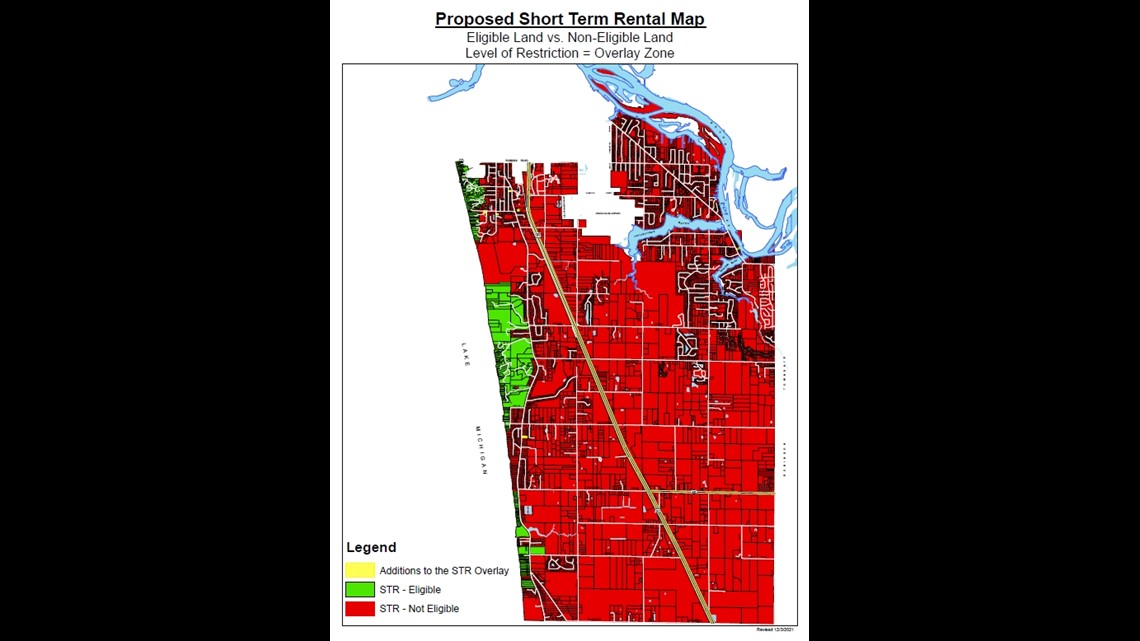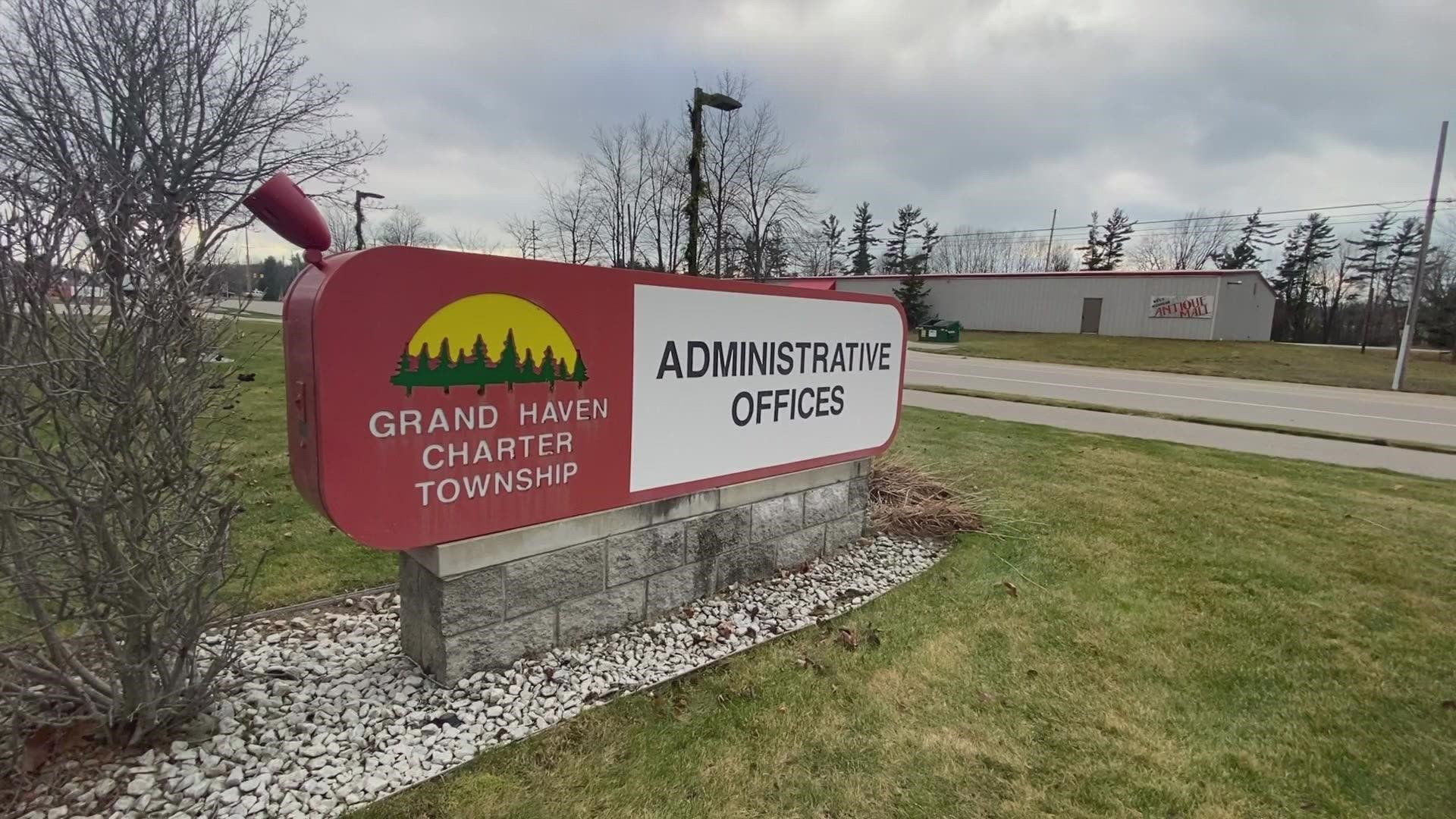GRAND HAVEN, Mich. — Short-term rental (STR) rules and regulations have long been a controversial subject in Michigan, and now that state legislation threatens the power of a municipality to regulate STRs, a local township is doing what they can to keep things how they are.
Currently, short term rentals in Grand Haven Charter Township (GHCT) are not allowed. But now, local officials are moving forward with a plan to allow them on a limited basis, and they're hoping that the state doesn't get in the way.
"We think that short term rentals can change the character of neighborhoods," said GHCT Manager Bill Cargo.
"The Supreme Court ruled that they are commercial properties," he added, "and they are basically small, little hotels that allow different people there every single night."
GHCT's Planning Commission and Board have been looking at restrictions for STRs since 2019, but Cargo said that the pandemic put that on hold as they couldn't meet in large gatherings to facilitate plans. That all changed this fall when they could return to in-person meetings.
"Coincidentally, that's when the Michigan House of Representatives passed a bill that would take away the power of local units of government to regulate STRs," Cargo said.
In October, the Michigan House approved House Bill 4722. If approved by the Senate and then signed into law by the Governor, this legislation would limit a municipality's ability to regulate short term rental properties. The state legislation would allow for 30% of all properties in the township to be short term rentals including for apps like Airbnb and VRBO.
"That would devastate the Township if that happened," Cargo said, "so we're hoping it's not going to be adopted by the Senate, we're hoping that if it is, it'll vetoed by the Governor."
And because they are hopeful, the GHCT's board and planning commission unanimously voted on November 3rd to adopt an overlay zone to regulate short term rentals in their own community.


"With this ordinance, in very restricted areas, we are going to allow short term rentals," said Cargo, "and all property owners will be able to rent their property for up to two weeks a year, twice, for up to seven days each."
The overlay zoning ordinance would create boundaries for where STR properties are located in the township. In order for a STR to operate under this ordinance, the property has to be inside the overlay zone but also must comply with the township's rental regulation ordinance.
Cargo said the one exception to the ordinance would be specific properties, like cottages, along Lake Michigan that have been STRs since the 1930's and have never caused any complaints by neighbors.
The township classifies short-term rentals as a property that is rented or subleased for less than 28 days. A limited STR for the township is a rental that is not rented for more than 14 days at a time, and 14 days total in a year. Cargo said that long-term rentals are allowed in Grand Haven Charter Township.
Under this local regulatory ordinance, any property within GHCT can be used as a limited STR, so if there is someone who wants their property to be included in the overlay zone, the owner would have to go through the rezoning process and then through a special land use process.
"There is a process available," said Cargo. "And they would have to be able to show the Planning Commission why they should be included in the STR overlay zone."
Cargo said they're fighting to keep control of regulation to protect the residential nature of the township and it's 19,000 residents, and that they will most likely hire a third party to do most of the enforcement of the ordinance.
"For a community like Grand Haven Charter Township, on the shores of Lake Michigan, which is a tourist destination, short term rentals, especially as unregulated as they are at the state level, would change the character of the neighborhoods," said Cargo, "and we want to protect the people who have bought and invested here and want to live here."
If House Bill 4722 goes through, it would override this township overlay ordinance, but leaders like Cargo are hoping they'll keep the ability to regulate these rentals themselves.
"It's what the residents want, it's what the elected officials want, and so that's what we're trying to protect," he said.
Cargo said that many neighborhood and homeowner associations in GHCT have their own set of rules that say they SRTs are not allowed. Those rules would most likely take precedence over any state law or legislation because of the association's bylaws.
"They're saying no, that's not what this neighborhood was intended to be," said Cargo. "It was not intended to allow these commercial enterprises to occur."
If the local legislation is able to go through, it would take effect in the first quarter of the year between January and April.
Other lakeshore communities like both the City of Grand Haven and the City of Holland have their own set of SRT property rules that would also be overturned if the state passes House Bill 4722.
►Make it easy to keep up to date with more stories like this. Download the 13 ON YOUR SIDE app now.
Have a news tip? Email news@13onyourside.com, visit our Facebook page or Twitter. Subscribe to our YouTube channel.

